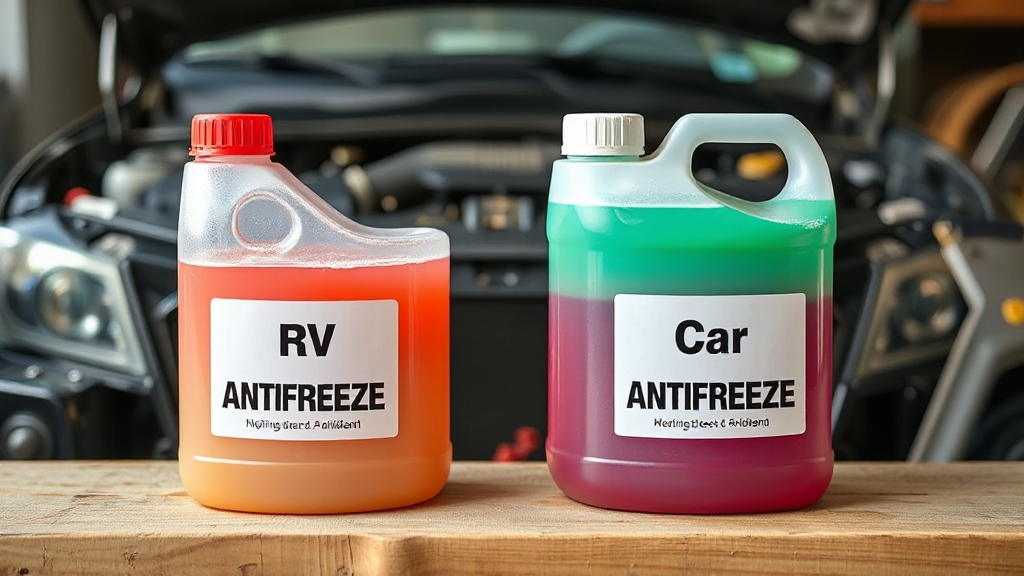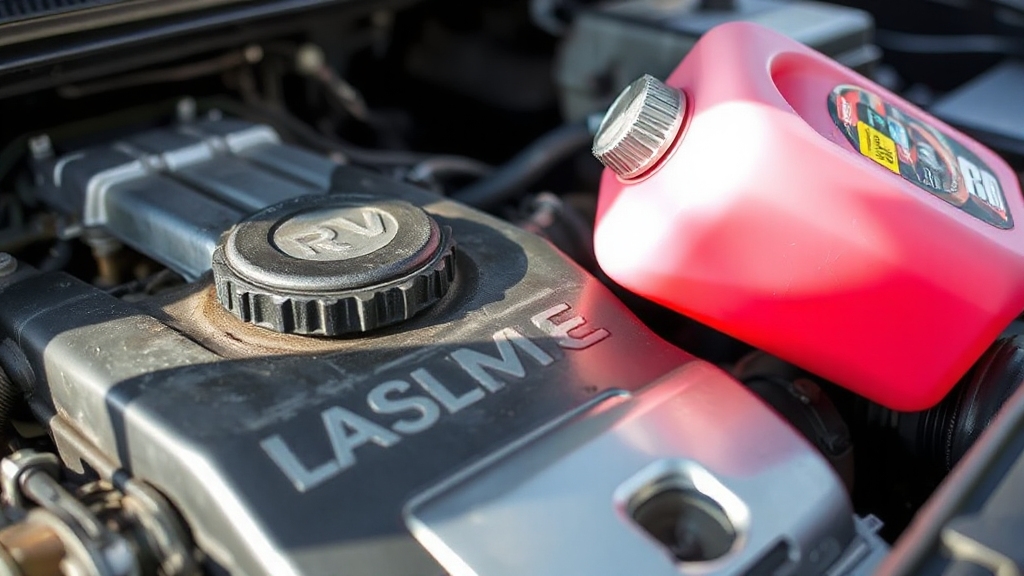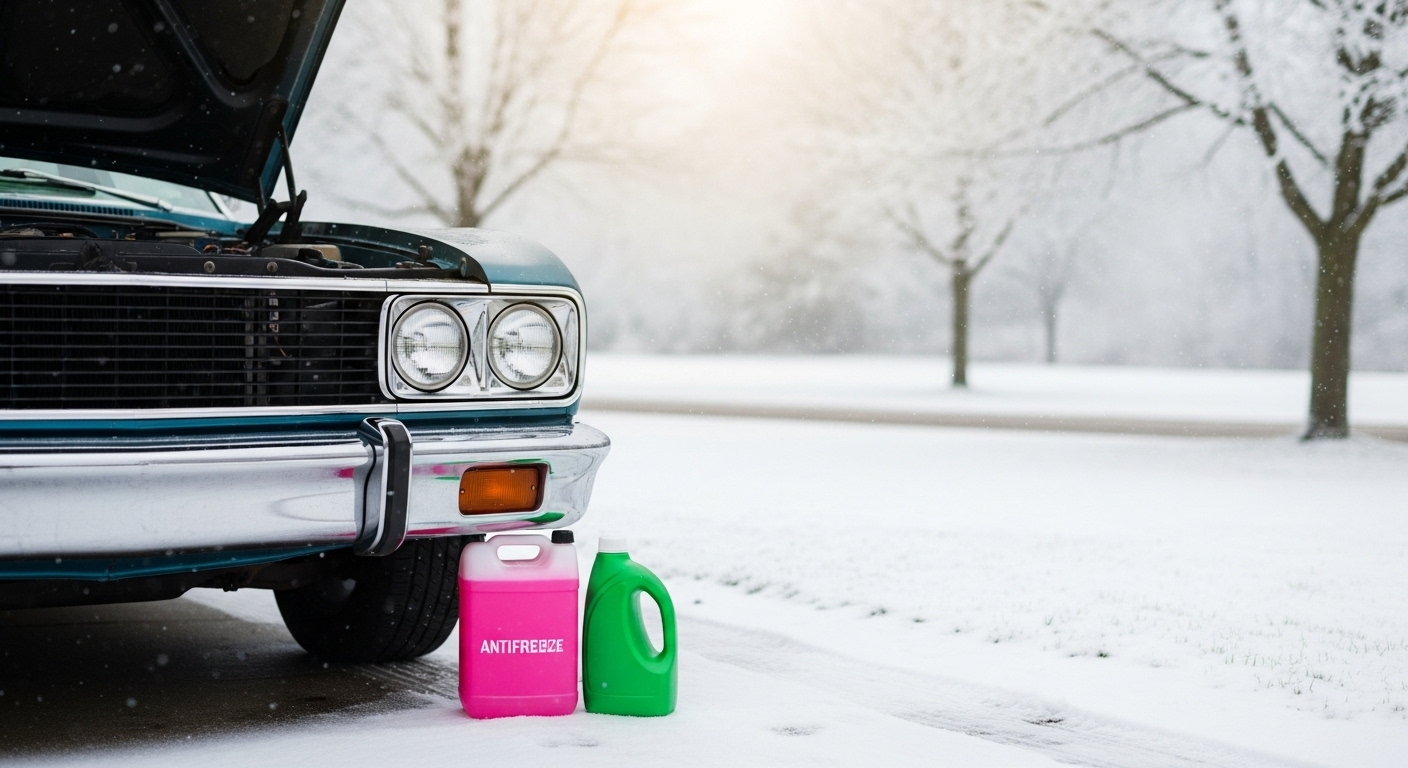You can’t use RV antifreeze in your car because it contains propylene glycol, designed for plumbing, not engine cooling. It lacks essential corrosion inhibitors and heat-transfer additives that protect your engine from overheating and corrosion. Using it risks clogging, damage, and reduced engine lifespan. Car antifreeze (ethylene glycol-based) supports high temperatures and pressure in cooling systems. If you want to understand the chemical differences, safety concerns, and consequences of improper use, keep exploring the details.
Key Takeaways
- RV antifreeze lacks essential corrosion inhibitors and heat transfer additives required for car engines, risking overheating and damage.
- It contains propylene glycol, safe for plumbing but not formulated for high engine temperatures or metal protection.
- Using RV antifreeze in cars can cause clogging, corrosion buildup, and reduce engine cooling efficiency.
- Automotive antifreeze with ethylene glycol is specifically designed for engine cooling systems and should be used instead.
- Substituting RV antifreeze in a car voids warranties and may lead to costly repairs and environmental hazards.
Understanding the Chemical Composition of RV and Car Antifreeze

Although both RV and car antifreeze serve to prevent freezing and protect systems, their chemical compositions differ fundamentally to suit their distinct applications. RV antifreeze primarily contains ethanol or propylene glycol, chosen for their lower toxicity and suitability in plumbing and potable water systems.
Many RV antifreeze products include a mixture of ethanol and propylene glycol, combining safety and compatibility benefits. It is important to note that RV antifreeze is not formulated to provide the corrosion protection needed in automotive cooling systems.
In contrast, car antifreeze predominantly uses ethylene glycol, sometimes propylene glycol, formulated to provide corrosion inhibition critical for engine protection. Ethylene glycol’s high toxicity renders it unsafe for RV systems, while propylene glycol and ethanol reduce toxicity risks but may affect rubber components differently.
You must recognize that automotive antifreeze’s chemical profile supports engine-specific thermal and corrosion demands, which RV antifreeze lacks. Hence, interchanging these products risks compromising system integrity due to incompatibility in chemical formulation and intended use.
The Role of Antifreeze in Car Engines
You rely on antifreeze to regulate your engine’s temperature by enhancing coolant flow and optimizing heat transfer. It also plays a critical role in preventing corrosion within the cooling system’s metal components. Understanding these functions helps you maintain engine efficiency and longevity.
Antifreeze typically consists of ethylene glycol or propylene glycol, which are essential for temperature regulation in engines. Valvoline Multi-Vehicle Antifreeze/Coolant is compatible with all vehicle makes and models because it contains the Alugard Plus additive.
Engine Cooling Function
When you consider the engine cooling system, antifreeze plays a crucial role in regulating temperature by lowering the coolant’s freezing point and raising its boiling point. This adjustment prevents the coolant from freezing in cold conditions and boiling under high engine temperatures, ensuring stable thermal management.
The coolant, a mixture of antifreeze and water, circulates through the engine block, absorbing excess heat generated by combustion. The water pump then pushes this heated coolant to the radiator, where heat dissipates into the atmosphere.
This continuous circulation helps prevent engine failures related to cooling issues. A 50/50 mixture of water and antifreeze is typically recommended to balance freeze protection and heat transfer effectively.
Maintaining ideal coolant concentration is essential; improper mixtures can impair heat transfer efficiency, risking overheating or freezing damage. Therefore, antifreeze directly supports the engine’s thermal regulation, preventing damage from temperature extremes and sustaining consistent performance within the liquid cooling system.
Corrosion Prevention Importance
Since engine components constantly face exposure to heat, moisture, and metal contact, corrosion prevention becomes essential for maintaining system integrity and performance. Antifreeze contains corrosion inhibitors—typically 10% additives within ethylene or propylene glycol—that actively prevent rust and electrolysis inside the cooling system.
These inhibitors protect critical components like radiators, heater cores, and aluminum parts from degradation caused by internal rust or electrically charged coolant. Maintaining a proper 50/50 antifreeze-water mixture ensures these additives function at their best year-round, avoiding scale buildup and preserving system efficiency.
It is important to note that coolant mixing different formulations beyond 25% can reduce corrosion protection and cause inhibitor dropout. Choosing antifreeze with Organic Acid Technology (OAT) enhances protection against aluminum corrosion and extends service life.
If corrosion occurs, it compromises heat exchange surfaces and can lead to premature component failure. Consequently, using antifreeze formulated specifically for automotive engines is vital to sustain corrosion resistance and guarantee consistent, reliable engine operation over time.
Heat Transfer Mechanism
Although water serves as the primary coolant in car engines, it requires antifreeze additives to provide freeze protection and inhibit corrosion effectively. Antifreeze, typically mixed 50-50 with water, slightly reduces heat transfer efficiency due to glycol content but raises the boiling point and lowers the freezing point, maintaining stable engine temperatures.
Aftermarket antifreeze products can vary in formulation, so it is important to choose one compatible with your vehicle’s specifications to avoid potential issues.
Understanding heat transfer involves:
- Coolant absorbs heat from engine metal, then transfers it to the radiator and air.
- The water pump circulates coolant continuously, ensuring uniform heat removal. It is important to maintain the recommended coolant concentration to balance freeze protection and heat transfer efficiency.
- System pressure elevates boiling point, preventing coolant vaporization at high temperatures. Using the correct antifreeze mixture also helps prevent corrosion and extends the longevity of engine components.
This balance between heat transfer efficiency and temperature regulation is critical. Using the correct antifreeze mixture ensures ideal engine cooling and longevity, whereas improper antifreeze formulas can impair heat dissipation and damage engine components.
Why RV Antifreeze Is Not Suitable for Engine Cooling Systems
You can’t use RV antifreeze in your car’s engine because its chemical composition lacks essential corrosion inhibitors and heat transfer additives. RV antifreeze is designed primarily for protecting plumbing and potable water systems rather than engine components.
Unlike automotive antifreeze, which is engineered to manage engine temperatures and protect metal components, RV antifreeze is formulated for potable water systems and doesn’t meet engine cooling requirements.
Since car engines typically have smaller and less complex cooling needs than RV engines, the antifreeze used must be specifically tailored to that environment to ensure proper engine protection.
Using the wrong type can also affect the performance and longevity of your engine cooling system. Using it risks overheating and premature damage to critical engine parts.
Chemical Composition Differences
When you compare RV antifreeze to automotive antifreeze, the chemical differences become essential in understanding why the former isn’t suitable for engine cooling systems. RV antifreeze primarily contains propylene glycol or ethanol, chosen for low toxicity and safety in potable water systems.
However, it lacks the specialized additives required for engine protection. Additionally, RV antifreeze is formulated specifically to prevent freezing in plumbing systems rather than to handle the high-temperature environments found in engines. It is also important to consider chemical compatibility when selecting fluids for different vehicle systems.
Automotive antifreeze, on the other hand, is ethylene glycol-based, highly toxic, and formulated with corrosion inhibitors and silicates to withstand high temperatures and protect engine metals.
Key distinctions include:
- Toxicity: RV antifreeze is non-toxic; automotive is highly toxic.
- Additives: RV antifreeze lacks corrosion inhibitors; automotive contains metal-specific inhibitors.
- Thermal Stability: RV antifreeze isn’t designed for high-temperature engine environments, unlike automotive antifreeze.
These chemical composition differences make RV antifreeze unsuitable for engine cooling systems.
Engine Cooling Requirements
How does an engine cooling system maintain peak performance under intense thermal stress? It relies on efficient heat dissipation through components like the radiator, thermostat, and coolant pump, using coolant engineered for rapid heat transfer and material compatibility.
The mixture of water and coolant agent is carefully balanced to optimize thermal absorption capacity and prevent overheating. Choosing the right fluid is critical, as some products like synthetic oils offer enhanced protection under extreme conditions.
Automotive coolant prevents corrosion, cavitation, and erosion while maintaining flow and protecting seals and hoses. RV antifreeze, formulated for plumbing systems, lacks these critical inhibitors and heat transfer properties.
It doesn’t withstand the engine’s thermal extremes or protect metal components adequately, risking overheating and system damage. Its formulation does not meet the higher Total Base Number standards required for automotive engine protection.
Its incompatibility with automotive materials can cause leaks and deterioration. Using RV antifreeze compromises freeze protection and voids warranties.
Simply put, RV antifreeze fails to meet stringent automotive cooling requirements, making it unsuitable for your car’s engine cooling system.
Potential Engine Damage From Using RV Antifreeze in Cars

Although RV antifreeze is formulated to protect plumbing systems from freezing, using it in car engines can cause significant damage due to its chemical composition and lack of essential protective properties.
RV antifreeze, based on propylene glycol, lacks the corrosion inhibitors and heat transfer capabilities present in automotive antifreeze. This can lead to:
- Corrosion buildup inside the engine and cooling system, damaging metal components.
- Inadequate heat dissipation, increasing the risk of engine overheating.
- Clogging and scaling within cooling passages, reducing coolant flow and efficiency.
Using RV antifreeze compromises engine longevity and performance by failing to meet the thermal and protective demands required for automotive engines. To avoid costly repairs, always use antifreeze specifically formulated for your vehicle’s engine specifications.
It is critical to understand that RV antifreeze contains propylene glycol, which is safe for plumbing but unsuitable for engine cooling systems. Additionally, automotive antifreeze contains corrosion inhibitors tailored to protect engine materials, which RV antifreeze does not provide.
Safety Concerns When Handling Different Types of Antifreeze
Because antifreeze contains chemicals that pose health and environmental risks, handling it requires strict adherence to safety protocols. When working with ethylene glycol antifreeze, store it in clearly labeled, tightly sealed containers away from children and pets.
Always wear gloves, safety goggles, and protective clothing to avoid skin contact and eye irritation. Understanding the chemical formulation of antifreeze is essential to ensure safe handling and compatibility with your vehicle’s cooling system.
Guarantee OSHA-compliant ventilation to minimize vapor inhalation and follow spill containment procedures rigorously.
For propylene glycol antifreeze, avoid direct skin contact and vapors, store in cool, ventilated areas, and use designated containers to prevent cross-contamination. Regularly test pH and inhibitor levels to maintain corrosion protection in your system.
In all cases, wash thoroughly after handling, avoid breathing fumes, and dispose of antifreeze according to local regulations. Equip yourself with respiratory protection if ventilation is inadequate. Promptly call a poison center if exposure symptoms occur.
Differences in Toxicity Between RV and Car Antifreeze
When comparing RV and car antifreeze, you’ll notice a critical distinction in their toxicity profiles tied to their primary chemical components. Car antifreeze mainly contains ethylene glycol, which is highly toxic to humans, animals, and the environment.
Conversely, RV antifreeze uses propylene glycol or ethanol-based formulas, which exhibit markedly lower toxicity levels. This difference impacts safety and environmental risks. Propylene Glycol antifreeze is considered the safest option for RVs and does not harm beneficial bacteria, making it ideal for use in holding tanks.
Consider these points:
- Human and Animal Toxicity: Ethylene glycol is acutely toxic if ingested or inhaled, while propylene glycol is generally non-toxic to humans but can harm animals.
- Environmental Impact: Ethylene glycol poses notable ecological hazards requiring careful disposal; propylene glycol’s environmental footprint is lower but not negligible.
- Usage Context: Car antifreeze is engineered for engine cooling, where toxicity is a major concern; RV antifreeze prioritizes safe plumbing use with reduced toxicity.
Proper Usage and Application of RV Antifreeze in Plumbing Systems
Understanding the differences in chemical composition and toxicity between RV and automotive antifreeze sets the stage for applying RV antifreeze correctly in your plumbing system. RV antifreeze, composed primarily of non-toxic propylene glycol, protects your pipes from freezing without contaminating potable water.
You’ll pour it directly into water lines during winterization to prevent burst damage and ensure long-term system integrity. It is important to avoid glycerin-based antifreeze because it can produce toxic chlorohydrins when exposed to chlorine, which are harmful to health.
| Factor | Specification | Application Benefit |
|---|---|---|
| Composition | Propylene glycol | Safe for potable water systems |
| Compatibility | Copper, plastic, steel | Broad plumbing material support |
| Freezing Point | Down to -50°F or -100°F | Superior freeze protection |
| Color | Dye-free | No staining or discoloration |
| Longevity | Up to 2 years | Extended protection interval |
Apply RV antifreeze thoroughly and sanitize systems before and after use to maintain system hygiene and performance.
Risks and Consequences of Cross-Using Antifreeze Types
Although RV and automotive antifreeze may seem interchangeable at a glance, using one in place of the other introduces significant risks due to their fundamentally different chemical compositions and intended applications.
RV antifreeze uses non-toxic propylene glycol to protect plumbing, while automotive antifreeze contains toxic ethylene glycol with corrosion inhibitors for engine cooling.
Cross-using them leads to:
- Mechanical failure—RV antifreeze lacks engine corrosion inhibitors, causing overheating and damage in cars. Additionally, automotive antifreeze contains specific additives that prevent corrosion and clogging within engine cooling systems.
- System contamination—automotive antifreeze poisons RV water lines, damaging pipes and fixtures.
- Environmental hazards—improper disposal of toxic automotive antifreeze risks pollution and legal issues.
You should never substitute one for the other because this compromises system integrity, safety, and compliance with environmental regulations.
Always use antifreeze formulated for your specific application.
Frequently Asked Questions
How Do I Properly Dispose of RV Antifreeze After Winterization?
After winterization, flush RV antifreeze thoroughly from your water system until clear water flows.
Drain holding tanks at designated dump stations, repeating flushes to guarantee removal.
Store used antifreeze in its original, sealed container without mixing fluids. Wear gloves during handling.
Then, take it to a municipal hazardous waste facility or an auto service center accepting antifreeze for recycling.
Always check local disposal regulations to stay compliant and protect the environment.
Can RV Antifreeze Be Used in Boat Plumbing Systems?
Yes, you can use RV antifreeze in boat plumbing systems, especially for winterizing fresh water lines. Just make certain the antifreeze is labeled safe for potable water and marine use.
It protects pipes from freezing and bursting but lacks corrosion inhibitors, so it’s not ideal for all systems. Always drain your system completely, bypass the water heater, and flush thoroughly before reuse to maintain safety and effectiveness.
What Are the Environmental Impacts of Improperly Discarded RV Antifreeze?
Imagine RV antifreeze as a silent poison seeping into nature’s veins. When you improperly discard it, you risk contaminating soil, water, and groundwater, disrupting delicate ecosystems.
This chemical intrusion alters soil pH, harms plants, and endangers aquatic and terrestrial wildlife. Its persistence can cause long-term ecological imbalance.
You must follow proper disposal methods and use biodegradable alternatives to mitigate these environmental hazards effectively and protect biodiversity.
How Often Should I Replace My Car’S Antifreeze?
You should replace your car’s antifreeze every 30,000 to 100,000 miles or every two to five years, depending on the coolant type and manufacturer’s recommendations.
Silicate-based coolants demand changes every two years or 30,000 miles, while extended-life coolants can last up to five years or 100,000 miles.
Always consult your owner’s manual for specific intervals, as severe driving conditions may require more frequent replacements to prevent engine damage.
Is RV Antifreeze Safe for Use in Home Heating Systems?
Using RV antifreeze in your home heating system is like fitting a square peg in a round hole—it’s not designed for that purpose.
RV antifreeze lacks the corrosion inhibitors critical for protecting metals like steel and cast iron in heating systems.
Though non-toxic and biodegradable, it risks causing system damage, leaks, and voids warranties.
For reliable, long-term protection, always choose antifreeze formulated and tested specifically for home heating applications.
One Wrong Note Can Ruin the Symphony: Avoid RV Antifreeze in Cars
Think of your car’s engine as a finely tuned orchestra—each component playing a crucial role in harmony. Using RV antifreeze in your car is like inviting a different instrument that’s out of tune; it disrupts the balance, risking damage and poor performance. Stick to the antifreeze designed for your engine’s chemistry to keep everything running smoothly and safely. Precision matters—don’t compromise your vehicle’s health with incompatible fluids.




